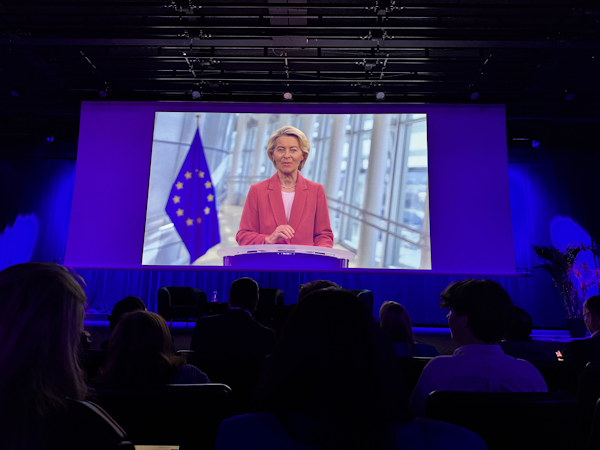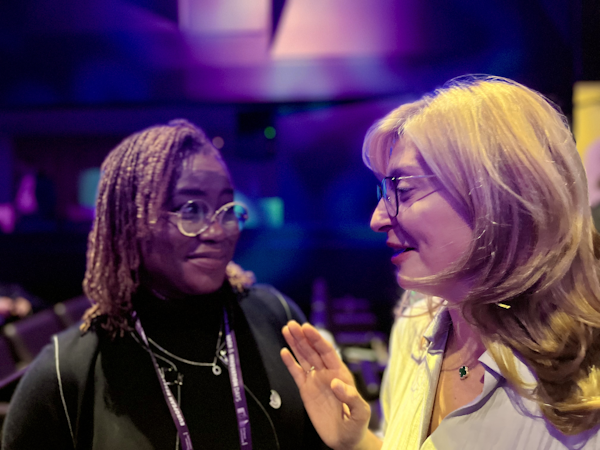EU Research and Innovation Days 2025 WiRE Participation Report
President of the European Commission, Ursula von der Leyen
Mont de Arts, Brussels, Belgium, September 16-17 - The EU Research and Innovation Days 2025, held in Brussels, convened a wide cross-section of the European and international research ecosystem, such as, policymakers, scientists, innovators, financiers, and representatives of civil society, to deliberate on Europe’s evolving innovation landscape. The event underscored the European Union’s ambition to consolidate its global leadership in science and innovation while advancing strategic priorities in sustainability, digital transformation, and social inclusion.
At the policy level, the European Commission announced a substantial expansion of Horizon Europe, doubling its budget and introducing long-term research support instruments such as the Supergrant Scheme and a Talent Mobility Package aimed at fostering transnational researcher circulation. These initiatives were presented as mechanisms to reverse Europe’s brain drain and stimulate a more interconnected and resilient research community.
The discourse was framed by an explicit emphasis on the green and digital transitions, with the European Investment Bank confirming continued investment in climate-aligned technologies and deep-tech innovation. Across plenary and breakout sessions, participants examined the intersection of research excellence and societal relevance, particularly the integration of climate action into innovation funding, the use of artificial intelligence in scientific discovery, and the creation of enabling policy frameworks through the forthcoming European Research Area (ERA) Act.
A noteworthy dimension of this year’s forum was its gender representation and inclusivity focus. More than half of the panellists were women, and several sessions addressed the systemic value of diversity in research ecosystems. The discussions recognised gender inclusivity not as a moral imperative alone but as a driver of innovation resilience, social equity, and global competitiveness. Panels on open science and AI ethics further reinforced the call for research systems that are transparent, collaborative, and reflective of diverse societal perspectives.
The event’s exhibition and digital networking sessions highlighted the tangible outcomes of EU-funded research projects and facilitated new partnerships across academia, industry, and government. Collectively, the proceedings reflected a European commitment to position science and innovation at the heart of economic recovery, climate action, and global collaboration.
Key Themes and Insights
Europe’s Strategic Vision for Science and Innovation
The opening address by the EU Commissioner for Research, Innovation, and Science set the tone with the call to “make Europe the best place in the world for research and innovation.”
Key policy updates included:
A €500 million Talent Mobility Package to attract global researchers.
A seven-year ‘super grant’ Scheme providing long-term research stability.
The doubling of Horizon Europe’s budget to €175 billion, with projected GDP returns of up to 11 euros per euro invested by 2045.
A new Startup and Scale-Up Strategy aimed at bridging regulatory and financing gaps for high-risk, high-tech ventures, particularly in clean technology, artificial intelligence, and green manufacturing.
These announcements demonstrate a decisive European shift toward scaling innovation that delivers tangible societal, environmental, and economic impact.
Research, Innovation, and the Green Transition
Panel session on Day 2 with Maria Cristina Russo, Anne Lane, Herald Holzer, Giles Requena
Throughout the sessions, the integration of climate action into R&I funding emerged as a recurring theme.
The European Investment Bank (EIB) reiterated its commitment to mobilising €300 billion in innovation financing since 2000, with a growing portfolio in climate-smart, green, and deep-tech ventures.
Green technology, particularly in renewable energy, clean manufacturing, and digital transformation, was positioned as a “cornerstone of Europe’s competitiveness and sovereignty.”
Advancing Gender Equity in Research and Innovation
First panel discussion, and an all-female discussants: Méabh MC Mahon, Ekaterina Zaharieva, Sylvia Schwaag Serger, Eva-Maria Holzleitner (On-Screen)
A strong gender dimension was woven throughout the event. Over half the panellists were women, an intentional milestone highlighted by organisers as “a good challenge for the future.”
Sessions spotlighted:
Women leading major scientific and entrepreneurial breakthroughs.
The importance of inclusive R&I ecosystems to ensure that talent, regardless of gender or geography, drives the green and digital transition.
The need to sustain mentorship, leadership pipelines, and visibility for women in science and clean technology sectors.
Open Science, Collaboration, and Digital Futures
Day 1 Event Schedule
Panels on AI in Science, Open Research, and The ERA (European Research Area) Act emphasised collaboration across borders, sectors, and disciplines.
Europe is positioning AI as both a scientific enabler and an ethical frontier.
The upcoming AI in Science Strategy (adopted 7 October 2025) and AI Insight Summit (Copenhagen, November 2025) will shape how data, computing, and ethics co-evolve.
Calls were made for a “Research and Innovation Union”: aligning national systems under shared values of freedom, transparency, and inclusivity.
These discussions highlight the importance of networks such as WiRE to connect diverse scientific communities, amplify female voices in data-driven innovation, and promote shared learning across regions.
Networking and Collaboration Opportunities
Engaging discussion with EU Commissioner for Startups, Research and Innovation, Ekaterina Zaharieva and WiRE UK Chapter Co-Lead, Dola Oluteye
The event’s interactive exhibition featured 17 EU-funded research projects, from robotics and AI to sustainable aviation and ocean health. The exhibition facilitated opportunities for engagements, I explored:
Partnerships for women-led renewable technology startups.
Collaboration with European universities and innovation hubs interested in cross-continental mentorship exchange programmes.
Opportunities for WiRE UK and EU counterparts to co-design training programmes around women in energy entrepreneurship, AI for renewables, and climate-smart innovation.
Reflections: Implications and Strategic Opportunities for WiRE
From an analytical perspective, the deliberations in Brussels illuminate several instructive pathways for the Women in Renewable Energy (WiRE) network to expand its influence and impact.
Visibility and Representation: The EU R&I ecosystem is intentionally embedding gender balance; WiRE should strengthen partnerships with EU programmes to co-host female-focused innovation challenges.
Embedding Gender Equity within Innovation Policy: The EU’s visible prioritisation of gender parity within its research agenda demonstrates the increasing institutional recognition that diversity enhances innovation outcomes. WiRE can capitalise on this momentum by articulating evidence-based arguments that women’s leadership in renewable energy accelerates both technological uptake and social legitimacy.
Strategic Alignment with European Research Frameworks: Horizon Europe’s expanded budget and new collaborative instruments provide fertile ground for WiRE to participate in joint research consortia, particularly in work programmes related to sustainable energy systems, digitalisation, and skills development.
Knowledge Exchange and Capacity Building: The conversations on talent mobility and open science highlight the importance of knowledge circulation. WiRE can respond by establishing exchange fellowships, mentorship schemes, and research residencies that connect women researchers and practitioners across borders.
Positioning in the Digital and AI-Driven Future of Energy: As artificial intelligence becomes integral to innovation ecosystems, WiRE can strategically position itself at the frontier of AI-for-renewables research. For instance, by organising interdisciplinary dialogues on ethical AI applications in energy systems, data governance, and just digital transitions.
Strengthening Policy-Science Interfaces: The EU R&I Days reaffirmed the importance of translating scientific evidence into policy. WiRE can serve as a knowledge intermediary between policymakers, industry, and academia, ensuring that gender-responsive perspectives inform renewable-energy policy design and implementation.
In essence, the Brussels deliberations portray a research landscape that increasingly values freedom, diversity, quality of life, stability, inclusivity, interdisciplinarity, and impact-oriented collaboration, among others. The participants indicated FREEDOM as the strongest advantage for researchers as captured in the photo below.
Participants view of EU’s strongest advantage for researchers
For WiRE, this moment offers more than symbolic participation, it presents a strategic inflection point to consolidate its academic partnerships, influence policy discourse, and embed women’s leadership within the knowledge architectures driving Europe’s green transition.







